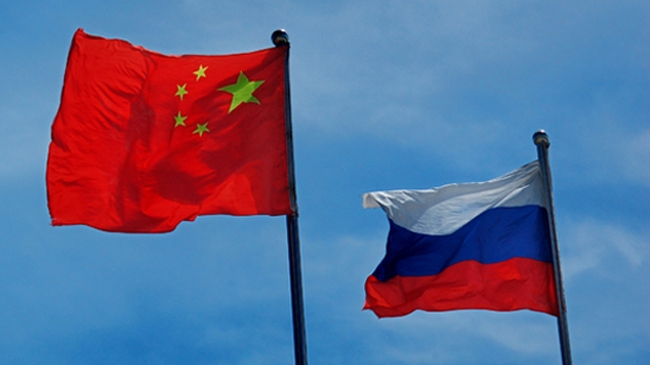Russia depends on oil and gas, which provide half the government’s revenues and almost 70 per cent of export earnings. If the state relaxed its grip on the economy and allowed a more independent judiciary, foreign investment would be encouraged and corruption discouraged. These changes would boost both manufacturing and services.
China’s economy is much more diversified, but it still needs to rebalance. Consumption takes only about a third of GDP, half the level of Europe. Investment levels are unusually high, at almost 50 per cent of GDP The credit system is managed so that citizens receive meager returns on their savings, state-owned enterprises get cheap credit, and investment in infrastructure and property is encouraged. The banks should serve the needs of the private sector, state-owned enterprises should become less dominant in the economy, and consumption should grow vis-à-vis investment. As in Russia, greater respect for the rule of law would help the economy to rebalance.
In both countries, some people in positions of power understand what reforms are needed. Prime Minister Dmitri Medvedev and some of his ministers have called for Russia to wean itself off natural-resource dependency. In China the 12th five-year plan, unveiled in 2011, called for a rebalancing. So did the "China 2030" report published last February by the World Bank and a government think-tank, and endorsed by incoming Prime Minister Li Keqiang. However, the 11th five-year plan, published in 2006, also called for rebalancing but had little impact.
The essential impediment to reform in both countries comes from powerful vested interests. In Russia, many of the clans around President Vladimir Putin along with the businessmen who control the big natural-resource companies and the security establishment do not want rebalancing. It would threaten their wealth and power. In China, many factions in the Communist Party, the leading state-owned enterprises and the security establishment are similarly attached to the rents and privileges provided by the current system.
Both countries have changed leaderships this year, but that does not necessarily auger well. Since Putin returned to the presidency in May he has shunned economic and political reform. When I met him in October under the auspices of the Valdai Club, he seemed complacent about the economy, and reformers within the system are gloomy.
It is too soon to judge the priorities of the new seven-man Standing Committee that took charge of China in November. However, though some of them talk the language of economic reform — and an anti-corruption drive has been launched — they all appear to be politically conservative.
In both countries, security establishments have gained power and financial resources in recent years, perhaps because rulers have felt insecure. By definition, security services — even in some Western countries — do not like to be constrained by the rule of law. In Russia and China they are closely tied to systemic corruption and the control of economic rents, which tends to make them hostile to rebalancing and the greater respect for the rule of law that would come with it.
But if vested interests in Russia and China block reform they will damage the potential of both economies. An unreformed Russia is highly vulnerable to a drop in oil prices. And even if prices remain high, an absence of reform will encourage capital and talent to keep seeping out of the country. Growth has already slowed to about 4 per cent a year, compared with pre-financial crisis levels of 7 or 8 per cent, and without rebalancing the long-term trend will be downward.
In China, too, the current economic model is reaching its limits: Growth has fallen from double digits to 7 or 8 per cent. Without reform, the economy will continue to suffer from overinvestment in heavy industry, infrastructure and property; state-owned enterprises will siphon wealth from other parts of the economy; and consumption will not grow fast enough to boost the relative importance of light manufacturing and services.
Slowing growth and rising unemployment would probably foster unrest in both countries. The governments of the other "BRICS" — Brazil, India and South Africa — enjoy legitimacy through relatively free and fair elections. But that applies neither to China, nor, arguably — despite Putin’s recent election victory and his real popularity — to Russia.
The main source of legitimacy for the Russian and Chinese regimes has been the economic growth that delivers rising living standards. But with growth already slowing — and likely to slow further if they spurn rebalancing — these regimes will need new means of legitimizing their authority.
They may be tempted to beat the nationalist drum more loudly. In fact, both Putin and Hu Jintao, the outgoing Chinese president, have been doing this for a while. Putin has upped his anti-American rhetoric, blamed foreign governments for demonstrations against his rule, and curbed the activities of foreign NGOs in Russia. More significantly, China has over the past three years — and this year especially — perturbed India, Vietnam, the Philippines and Japan with its more assertive line on longstanding territorial disputes.
The West must hope that Russian and Chinese leaders are bold enough to take on vested interests and push through serious reforms. Otherwise Russia and China will grow more slowly than they should, which may well result in more strident nationalism. Then Western countries that hope to co-opt them in tackling global economic and security challenges would find them very prickly partners.
Charles Grant is director of the Centre for European Reform.

